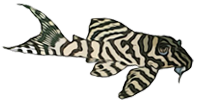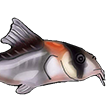Deworming W.C. Plecos Ergamisole/Tramisol/Levamisole?
- BK
- Posts: 182
- Joined: 07 Jan 2003, 22:02
- My cats species list: 6 (i:0, k:0)
- Location 1: Wisconsin
- Contact:
Deworming W.C. Plecos Ergamisole/Tramisol/Levamisole?
HI,
I have read that sometimes wild caught plecos need/should be to be dewormed and since I just ordered six wild caught L66 (and hopefully an L25) I had some questions on this issue. Would you more experienced pleco keepers out there recommend deworming all wild caught plecos at the time of purchase as a preventative measure, only if the fish definitely has worms, or not at all?
I have heard that Ergamisole/Tramisol/Levamisole works well and I was wondering how it is used to deworm plecos? What concentration and is it administered through food or through adding it to the tank water? Is the water soluble powder used?
Are there any better or easier to obtain worming medicines out there?
I would hate to loose these fish if they have worms or to have them spread it to my other fish.
I have read that sometimes wild caught plecos need/should be to be dewormed and since I just ordered six wild caught L66 (and hopefully an L25) I had some questions on this issue. Would you more experienced pleco keepers out there recommend deworming all wild caught plecos at the time of purchase as a preventative measure, only if the fish definitely has worms, or not at all?
I have heard that Ergamisole/Tramisol/Levamisole works well and I was wondering how it is used to deworm plecos? What concentration and is it administered through food or through adding it to the tank water? Is the water soluble powder used?
Are there any better or easier to obtain worming medicines out there?
I would hate to loose these fish if they have worms or to have them spread it to my other fish.
-
aeroflight
- Posts: 83
- Joined: 15 Feb 2003, 23:16
- Location 1: Albuquerque, NM, USA
Well, I don't consider myself an experienced pleco keeper by any stretch of the imagination, but I thought I'd toss in my 2 cents.
I recently (4 days ago) used some Levasole (levamisole hydrochloride) to deworm my 135g tank containing 2 oscars (I know they're cichlids, forgive me), 3 pictus cats, and a sailfin pleco. At least one of the oscars was infected with camallanus worms.
The Levasole was a water soluble powder (looks like yellow Kool-Aid when mixed). I dosed my entire tank at roughly 7.5 mg/l. I left it in there for 24 hours, after which I did a rather substantial water change (~75%). Within an hour of adding the dose of Levasole to the tank, the worms were starting to leave (fall out of) the oscar. No worms were visible on/in any of the fish 2 hours after adding the medication. None of the fish in the tank showed any signs of distress. They acted no differently than they always do. I haven't noticed any side effects at all.
I found my info on using levamisole HCl and its dosing here. I'd definitely suggest finding the water soluble powder. I read that some have used deworming oblets and had to grind them into powder, not all of which was soluble and resulted in a clouded tank.
Hope this helps. Good luck!
I recently (4 days ago) used some Levasole (levamisole hydrochloride) to deworm my 135g tank containing 2 oscars (I know they're cichlids, forgive me), 3 pictus cats, and a sailfin pleco. At least one of the oscars was infected with camallanus worms.
The Levasole was a water soluble powder (looks like yellow Kool-Aid when mixed). I dosed my entire tank at roughly 7.5 mg/l. I left it in there for 24 hours, after which I did a rather substantial water change (~75%). Within an hour of adding the dose of Levasole to the tank, the worms were starting to leave (fall out of) the oscar. No worms were visible on/in any of the fish 2 hours after adding the medication. None of the fish in the tank showed any signs of distress. They acted no differently than they always do. I haven't noticed any side effects at all.
I found my info on using levamisole HCl and its dosing here. I'd definitely suggest finding the water soluble powder. I read that some have used deworming oblets and had to grind them into powder, not all of which was soluble and resulted in a clouded tank.
Hope this helps. Good luck!
My wife likes cats.
I like catfish.
I like catfish.
BK, Sorry I never got back to you on this, it completely slipped my mind. Besides the deworming you may want to think about a Formalin dip to get rid of Gill Flukes. I like to use an Airsone and a five gallon bucket filled roughly 3/4 full w/ water out of my Q-tank. There's decent enough instructions on a bottle of Formalin 3 but I normally wouldn't recomend dipping for more than 25 to 30 minutes. If you want a more in depth explanation PM me. I promise I'll get back to you this time 
-
aeroflight
- Posts: 83
- Joined: 15 Feb 2003, 23:16
- Location 1: Albuquerque, NM, USA
Llittle red thread-like worms protruding from the anus of your fish is a good indication of a camallanus infestation (I don't know if infestation is an appropriate word, but ...). My infected oscar showed about 3-4 of these worms extending out about 1/8" or so. After deworming my tank with Levasole, I could see that some of these worms were actually closer to 3/4" in length (I never actually measured them after they'd come out of the fish). I just googled camallanus to find out more info. The article I linked to above was pretty good info too.
As for Levasole, I found it at an animal health supply store and a country feed store. It's actually a deworming agent for sheep, goats, cattle, etc. I paid $15 US for a 13 gram packet containing 11.7 grams of levamisole HCl. This single packet is enough to treat my 135g tank 3 times at roughtly 7.5 mg/l. The Levasole solution (after you mix it with water) is good for 90 days, allowing you (or me) to retreat a couple weeks after the initial dose to make sure that anything that survived the first treatment won't be able to reinfect the tank.
As for Levasole, I found it at an animal health supply store and a country feed store. It's actually a deworming agent for sheep, goats, cattle, etc. I paid $15 US for a 13 gram packet containing 11.7 grams of levamisole HCl. This single packet is enough to treat my 135g tank 3 times at roughtly 7.5 mg/l. The Levasole solution (after you mix it with water) is good for 90 days, allowing you (or me) to retreat a couple weeks after the initial dose to make sure that anything that survived the first treatment won't be able to reinfect the tank.
My wife likes cats.
I like catfish.
I like catfish.
- Yann
- Posts: 3617
- Joined: 30 Dec 2002, 20:56
- I've donated: $20.00!
- My articles: 8
- My images: 275
- My cats species list: 81 (i:0, k:0)
- My BLogs: 2 (i:3, p:81)
- Spotted: 109
- Location 1: Switzerland
- Location 2: Switzerland
- Interests: Catfish mainly form South America, Cichlids, Geckos, Horses WWII airplanes, Orchids
Hi!
Well worms is usually the most frequent topic what ever forum it is!
I have read in one french forum talking about cichlids, that Garlic cut in very little piecesa nd added to the food, once eaten by the fish would be as usefull than any other medication to deworm the fish.
I don't know if this would be possible with catfish, if it would work with them, I guess the hardest part would make them eat that stuff!!!
Cheers
Yann
Well worms is usually the most frequent topic what ever forum it is!
I have read in one french forum talking about cichlids, that Garlic cut in very little piecesa nd added to the food, once eaten by the fish would be as usefull than any other medication to deworm the fish.
I don't know if this would be possible with catfish, if it would work with them, I guess the hardest part would make them eat that stuff!!!
Cheers
Yann
Don't Give Up, Don't Ever Give Up!
-
Plec0maniac
- Posts: 326
- Joined: 08 Apr 2003, 10:46
- Location 1: Manila, Philippines
hi for my newly arrived plecs, I use white crane furazan gold, heater, and chloromycetine.(sorry i dont know the other name for this!) But this stuff is very good for plecs with internal problems, especially bloted ones..  Hope this myght help...
Hope this myght help...
Too many gorgeous loricariids
So hard to obtain! Grrr....
So hard to obtain! Grrr....
-
Steen
- Posts: 64
- Joined: 01 Jan 2003, 13:10
- My cats species list: 7 (i:2, k:0)
- Spotted: 6
- Location 2: Denmark _ Copenhagen
Hi, talking about garlic I have read the same thing mentioned by Yann. Now I put some fresh garlic in my homemade food (blended raw shrimp, peas, spinache, cod, banana, carrots and more) and everybody is eating it. Off course I don't know if is helps for anything or if the dose is right, haven't done any harm I guess.
My cat's: Hypancistrus sp.(L66), H.zebra, Panaque maccus, P.nigrolineatus, Peckoltia sp.(L205?), Synodontis euptera, Pseudacanthicus cf. leopardus
-
Guy
- Posts: 30
- Joined: 13 Feb 2003, 10:59
- I've donated: $25.00!
- Location 1: Ireland
Waterlife have a product called Sterazin for deworming and de-fluking. It's about 5 of your earth pounds and certainly works for skin flukes. It claims to target most parsasites. The only drawback is it's a course that requires treatments on Day 1, 3, 5, 8 and 10 (or something like that). Doesn't seem to bother the fish though.
Guy
Guy
-
aeroflight
- Posts: 83
- Joined: 15 Feb 2003, 23:16
- Location 1: Albuquerque, NM, USA
Levasole and Tramisol (both contain levamisole hydrochloride) are off-the-shelf products (at least in my area they are). You just won't find them on the fish shelf. You'll have to look at a feed or farm animal supply store. If you can't find them there, you may be able to get them from a vet.
My wife likes cats.
I like catfish.
I like catfish.




